Understanding Educational Challenges for International Students in UK
VerifiedAdded on 2023/01/13
|11
|2751
|38
Literature Review
AI Summary
This literature review examines the educational challenges faced by primary and secondary-level international students in the UK, specifically focusing on students who migrated from India. The review explores key themes such as cultural adaptation, language barriers, psychological distress, and financial difficulties. It highlights issues like discrimination, socioeconomic factors, and the impact of parental background on student performance. The review synthesizes research on the challenges related to language proficiency, curriculum differences, and the influence of financial constraints on academic outcomes. The findings emphasize the importance of addressing these challenges to improve the educational experiences and overall performance of international students in the UK. The review concludes by summarizing the key findings and their implications for understanding the complex factors affecting international students' academic success.
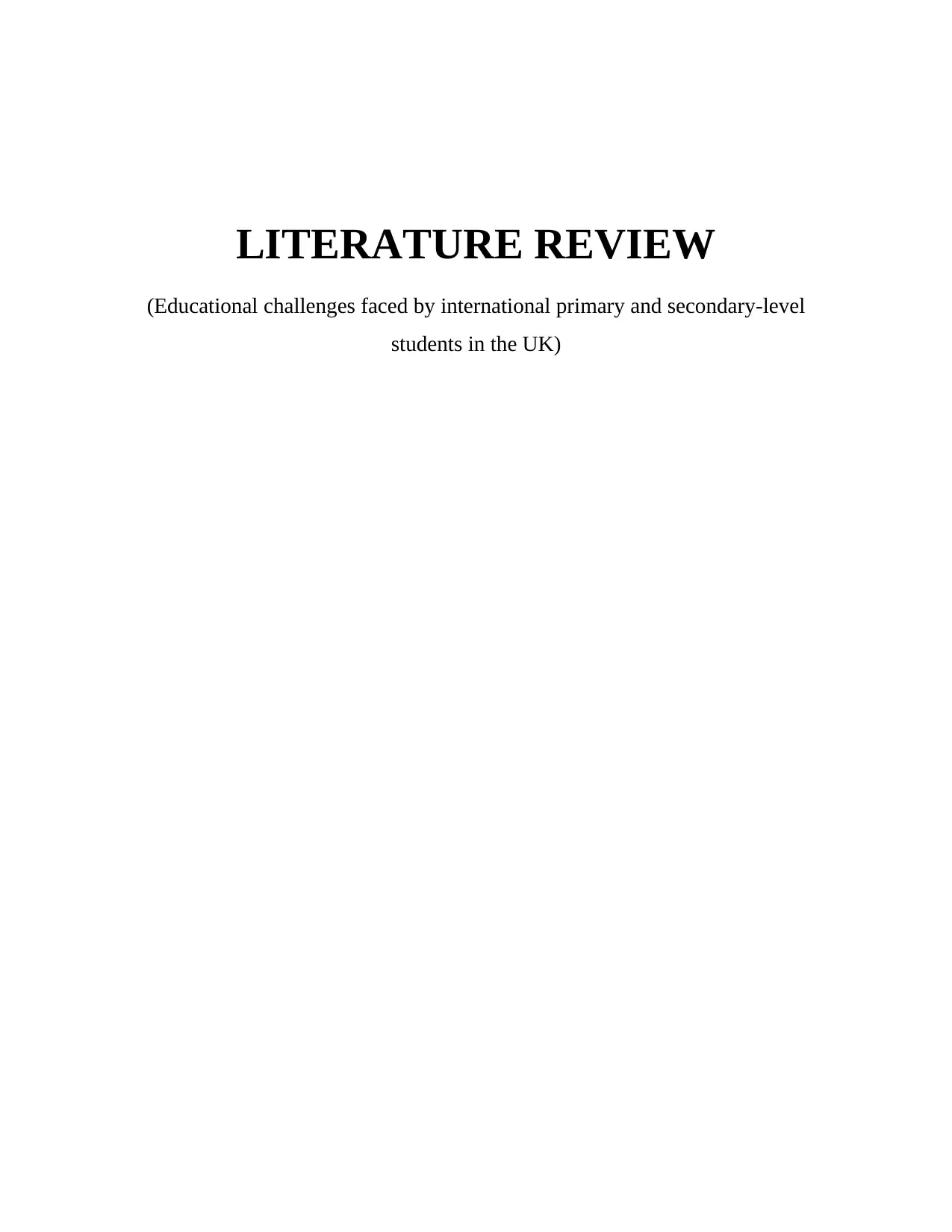
LITERATURE REVIEW
(Educational challenges faced by international primary and secondary-level
students in the UK)
(Educational challenges faced by international primary and secondary-level
students in the UK)
Paraphrase This Document
Need a fresh take? Get an instant paraphrase of this document with our AI Paraphraser

TABLE OF CONTENTS
TITLE..............................................................................................................................................1
LITERATURE REVIEW................................................................................................................1
REFERENCES................................................................................................................................6
TITLE..............................................................................................................................................1
LITERATURE REVIEW................................................................................................................1
REFERENCES................................................................................................................................6
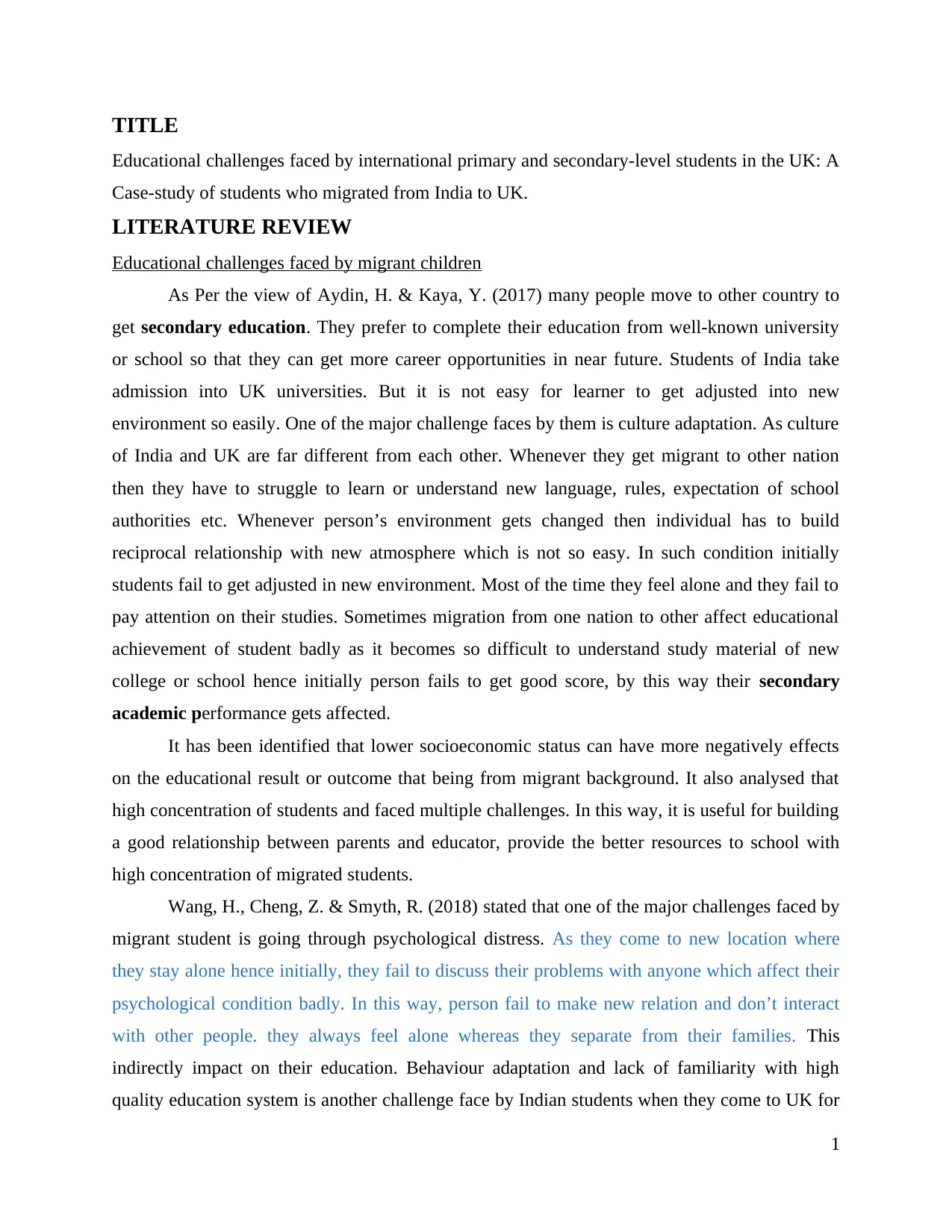
TITLE
Educational challenges faced by international primary and secondary-level students in the UK: A
Case-study of students who migrated from India to UK.
LITERATURE REVIEW
Educational challenges faced by migrant children
As Per the view of Aydin, H. & Kaya, Y. (2017) many people move to other country to
get secondary education. They prefer to complete their education from well-known university
or school so that they can get more career opportunities in near future. Students of India take
admission into UK universities. But it is not easy for learner to get adjusted into new
environment so easily. One of the major challenge faces by them is culture adaptation. As culture
of India and UK are far different from each other. Whenever they get migrant to other nation
then they have to struggle to learn or understand new language, rules, expectation of school
authorities etc. Whenever person’s environment gets changed then individual has to build
reciprocal relationship with new atmosphere which is not so easy. In such condition initially
students fail to get adjusted in new environment. Most of the time they feel alone and they fail to
pay attention on their studies. Sometimes migration from one nation to other affect educational
achievement of student badly as it becomes so difficult to understand study material of new
college or school hence initially person fails to get good score, by this way their secondary
academic performance gets affected.
It has been identified that lower socioeconomic status can have more negatively effects
on the educational result or outcome that being from migrant background. It also analysed that
high concentration of students and faced multiple challenges. In this way, it is useful for building
a good relationship between parents and educator, provide the better resources to school with
high concentration of migrated students.
Wang, H., Cheng, Z. & Smyth, R. (2018) stated that one of the major challenges faced by
migrant student is going through psychological distress. As they come to new location where
they stay alone hence initially, they fail to discuss their problems with anyone which affect their
psychological condition badly. In this way, person fail to make new relation and don’t interact
with other people. they always feel alone whereas they separate from their families. This
indirectly impact on their education. Behaviour adaptation and lack of familiarity with high
quality education system is another challenge face by Indian students when they come to UK for
1
Educational challenges faced by international primary and secondary-level students in the UK: A
Case-study of students who migrated from India to UK.
LITERATURE REVIEW
Educational challenges faced by migrant children
As Per the view of Aydin, H. & Kaya, Y. (2017) many people move to other country to
get secondary education. They prefer to complete their education from well-known university
or school so that they can get more career opportunities in near future. Students of India take
admission into UK universities. But it is not easy for learner to get adjusted into new
environment so easily. One of the major challenge faces by them is culture adaptation. As culture
of India and UK are far different from each other. Whenever they get migrant to other nation
then they have to struggle to learn or understand new language, rules, expectation of school
authorities etc. Whenever person’s environment gets changed then individual has to build
reciprocal relationship with new atmosphere which is not so easy. In such condition initially
students fail to get adjusted in new environment. Most of the time they feel alone and they fail to
pay attention on their studies. Sometimes migration from one nation to other affect educational
achievement of student badly as it becomes so difficult to understand study material of new
college or school hence initially person fails to get good score, by this way their secondary
academic performance gets affected.
It has been identified that lower socioeconomic status can have more negatively effects
on the educational result or outcome that being from migrant background. It also analysed that
high concentration of students and faced multiple challenges. In this way, it is useful for building
a good relationship between parents and educator, provide the better resources to school with
high concentration of migrated students.
Wang, H., Cheng, Z. & Smyth, R. (2018) stated that one of the major challenges faced by
migrant student is going through psychological distress. As they come to new location where
they stay alone hence initially, they fail to discuss their problems with anyone which affect their
psychological condition badly. In this way, person fail to make new relation and don’t interact
with other people. they always feel alone whereas they separate from their families. This
indirectly impact on their education. Behaviour adaptation and lack of familiarity with high
quality education system is another challenge face by Indian students when they come to UK for
1
⊘ This is a preview!⊘
Do you want full access?
Subscribe today to unlock all pages.

Trusted by 1+ million students worldwide
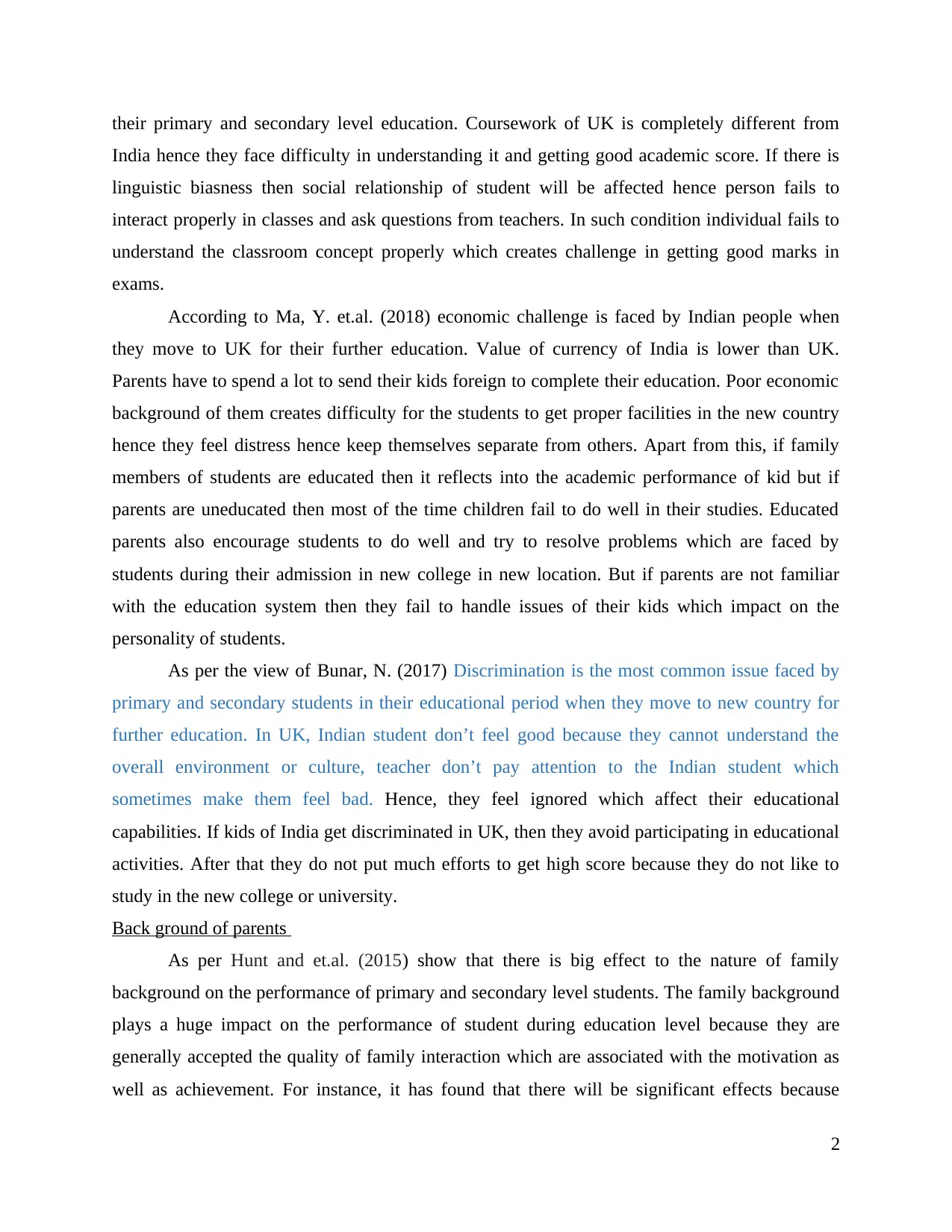
their primary and secondary level education. Coursework of UK is completely different from
India hence they face difficulty in understanding it and getting good academic score. If there is
linguistic biasness then social relationship of student will be affected hence person fails to
interact properly in classes and ask questions from teachers. In such condition individual fails to
understand the classroom concept properly which creates challenge in getting good marks in
exams.
According to Ma, Y. et.al. (2018) economic challenge is faced by Indian people when
they move to UK for their further education. Value of currency of India is lower than UK.
Parents have to spend a lot to send their kids foreign to complete their education. Poor economic
background of them creates difficulty for the students to get proper facilities in the new country
hence they feel distress hence keep themselves separate from others. Apart from this, if family
members of students are educated then it reflects into the academic performance of kid but if
parents are uneducated then most of the time children fail to do well in their studies. Educated
parents also encourage students to do well and try to resolve problems which are faced by
students during their admission in new college in new location. But if parents are not familiar
with the education system then they fail to handle issues of their kids which impact on the
personality of students.
As per the view of Bunar, N. (2017) Discrimination is the most common issue faced by
primary and secondary students in their educational period when they move to new country for
further education. In UK, Indian student don’t feel good because they cannot understand the
overall environment or culture, teacher don’t pay attention to the Indian student which
sometimes make them feel bad. Hence, they feel ignored which affect their educational
capabilities. If kids of India get discriminated in UK, then they avoid participating in educational
activities. After that they do not put much efforts to get high score because they do not like to
study in the new college or university.
Back ground of parents
As per Hunt and et.al. (2015) show that there is big effect to the nature of family
background on the performance of primary and secondary level students. The family background
plays a huge impact on the performance of student during education level because they are
generally accepted the quality of family interaction which are associated with the motivation as
well as achievement. For instance, it has found that there will be significant effects because
2
India hence they face difficulty in understanding it and getting good academic score. If there is
linguistic biasness then social relationship of student will be affected hence person fails to
interact properly in classes and ask questions from teachers. In such condition individual fails to
understand the classroom concept properly which creates challenge in getting good marks in
exams.
According to Ma, Y. et.al. (2018) economic challenge is faced by Indian people when
they move to UK for their further education. Value of currency of India is lower than UK.
Parents have to spend a lot to send their kids foreign to complete their education. Poor economic
background of them creates difficulty for the students to get proper facilities in the new country
hence they feel distress hence keep themselves separate from others. Apart from this, if family
members of students are educated then it reflects into the academic performance of kid but if
parents are uneducated then most of the time children fail to do well in their studies. Educated
parents also encourage students to do well and try to resolve problems which are faced by
students during their admission in new college in new location. But if parents are not familiar
with the education system then they fail to handle issues of their kids which impact on the
personality of students.
As per the view of Bunar, N. (2017) Discrimination is the most common issue faced by
primary and secondary students in their educational period when they move to new country for
further education. In UK, Indian student don’t feel good because they cannot understand the
overall environment or culture, teacher don’t pay attention to the Indian student which
sometimes make them feel bad. Hence, they feel ignored which affect their educational
capabilities. If kids of India get discriminated in UK, then they avoid participating in educational
activities. After that they do not put much efforts to get high score because they do not like to
study in the new college or university.
Back ground of parents
As per Hunt and et.al. (2015) show that there is big effect to the nature of family
background on the performance of primary and secondary level students. The family background
plays a huge impact on the performance of student during education level because they are
generally accepted the quality of family interaction which are associated with the motivation as
well as achievement. For instance, it has found that there will be significant effects because
2
Paraphrase This Document
Need a fresh take? Get an instant paraphrase of this document with our AI Paraphraser
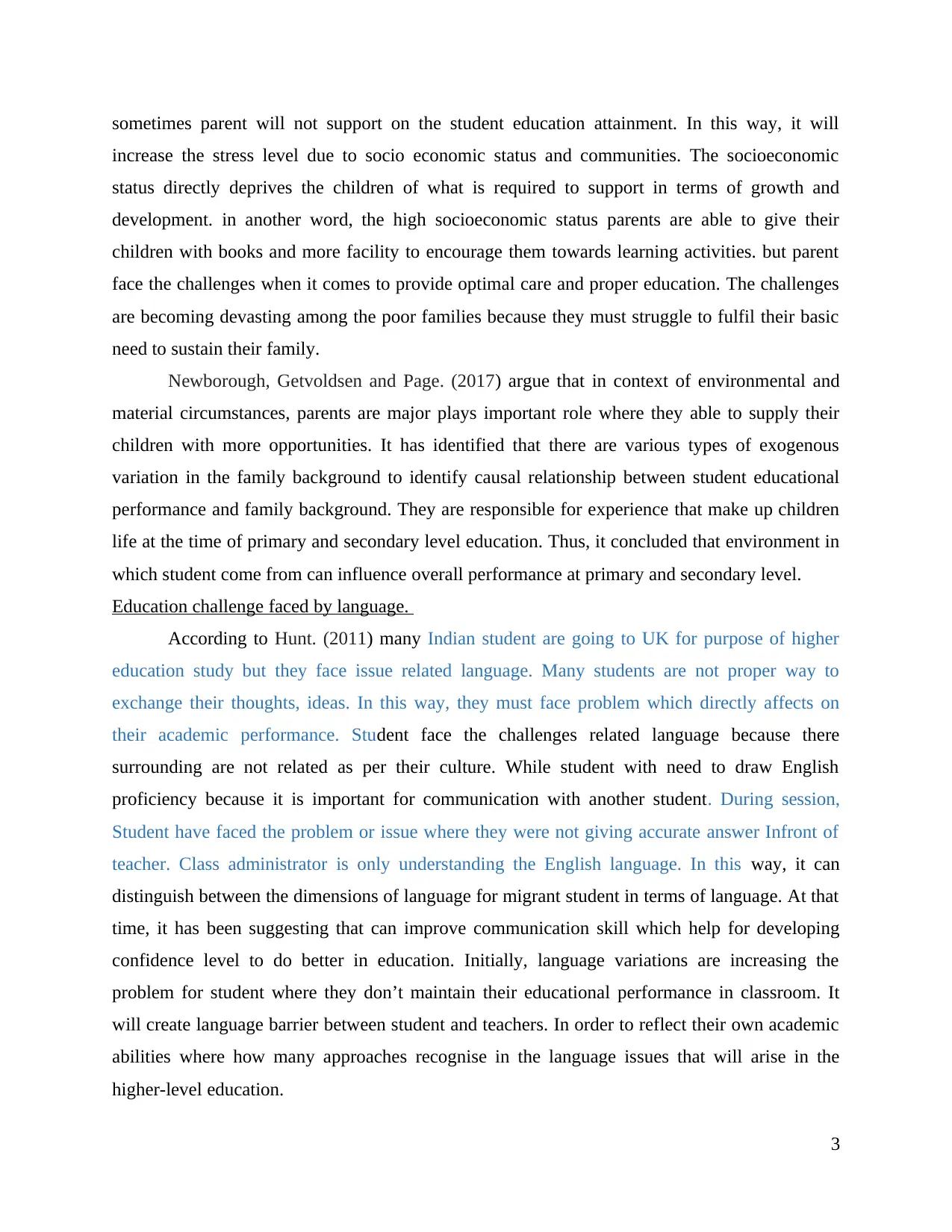
sometimes parent will not support on the student education attainment. In this way, it will
increase the stress level due to socio economic status and communities. The socioeconomic
status directly deprives the children of what is required to support in terms of growth and
development. in another word, the high socioeconomic status parents are able to give their
children with books and more facility to encourage them towards learning activities. but parent
face the challenges when it comes to provide optimal care and proper education. The challenges
are becoming devasting among the poor families because they must struggle to fulfil their basic
need to sustain their family.
Newborough, Getvoldsen and Page. (2017) argue that in context of environmental and
material circumstances, parents are major plays important role where they able to supply their
children with more opportunities. It has identified that there are various types of exogenous
variation in the family background to identify causal relationship between student educational
performance and family background. They are responsible for experience that make up children
life at the time of primary and secondary level education. Thus, it concluded that environment in
which student come from can influence overall performance at primary and secondary level.
Education challenge faced by language.
According to Hunt. (2011) many Indian student are going to UK for purpose of higher
education study but they face issue related language. Many students are not proper way to
exchange their thoughts, ideas. In this way, they must face problem which directly affects on
their academic performance. Student face the challenges related language because there
surrounding are not related as per their culture. While student with need to draw English
proficiency because it is important for communication with another student. During session,
Student have faced the problem or issue where they were not giving accurate answer Infront of
teacher. Class administrator is only understanding the English language. In this way, it can
distinguish between the dimensions of language for migrant student in terms of language. At that
time, it has been suggesting that can improve communication skill which help for developing
confidence level to do better in education. Initially, language variations are increasing the
problem for student where they don’t maintain their educational performance in classroom. It
will create language barrier between student and teachers. In order to reflect their own academic
abilities where how many approaches recognise in the language issues that will arise in the
higher-level education.
3
increase the stress level due to socio economic status and communities. The socioeconomic
status directly deprives the children of what is required to support in terms of growth and
development. in another word, the high socioeconomic status parents are able to give their
children with books and more facility to encourage them towards learning activities. but parent
face the challenges when it comes to provide optimal care and proper education. The challenges
are becoming devasting among the poor families because they must struggle to fulfil their basic
need to sustain their family.
Newborough, Getvoldsen and Page. (2017) argue that in context of environmental and
material circumstances, parents are major plays important role where they able to supply their
children with more opportunities. It has identified that there are various types of exogenous
variation in the family background to identify causal relationship between student educational
performance and family background. They are responsible for experience that make up children
life at the time of primary and secondary level education. Thus, it concluded that environment in
which student come from can influence overall performance at primary and secondary level.
Education challenge faced by language.
According to Hunt. (2011) many Indian student are going to UK for purpose of higher
education study but they face issue related language. Many students are not proper way to
exchange their thoughts, ideas. In this way, they must face problem which directly affects on
their academic performance. Student face the challenges related language because there
surrounding are not related as per their culture. While student with need to draw English
proficiency because it is important for communication with another student. During session,
Student have faced the problem or issue where they were not giving accurate answer Infront of
teacher. Class administrator is only understanding the English language. In this way, it can
distinguish between the dimensions of language for migrant student in terms of language. At that
time, it has been suggesting that can improve communication skill which help for developing
confidence level to do better in education. Initially, language variations are increasing the
problem for student where they don’t maintain their educational performance in classroom. It
will create language barrier between student and teachers. In order to reflect their own academic
abilities where how many approaches recognise in the language issues that will arise in the
higher-level education.
3
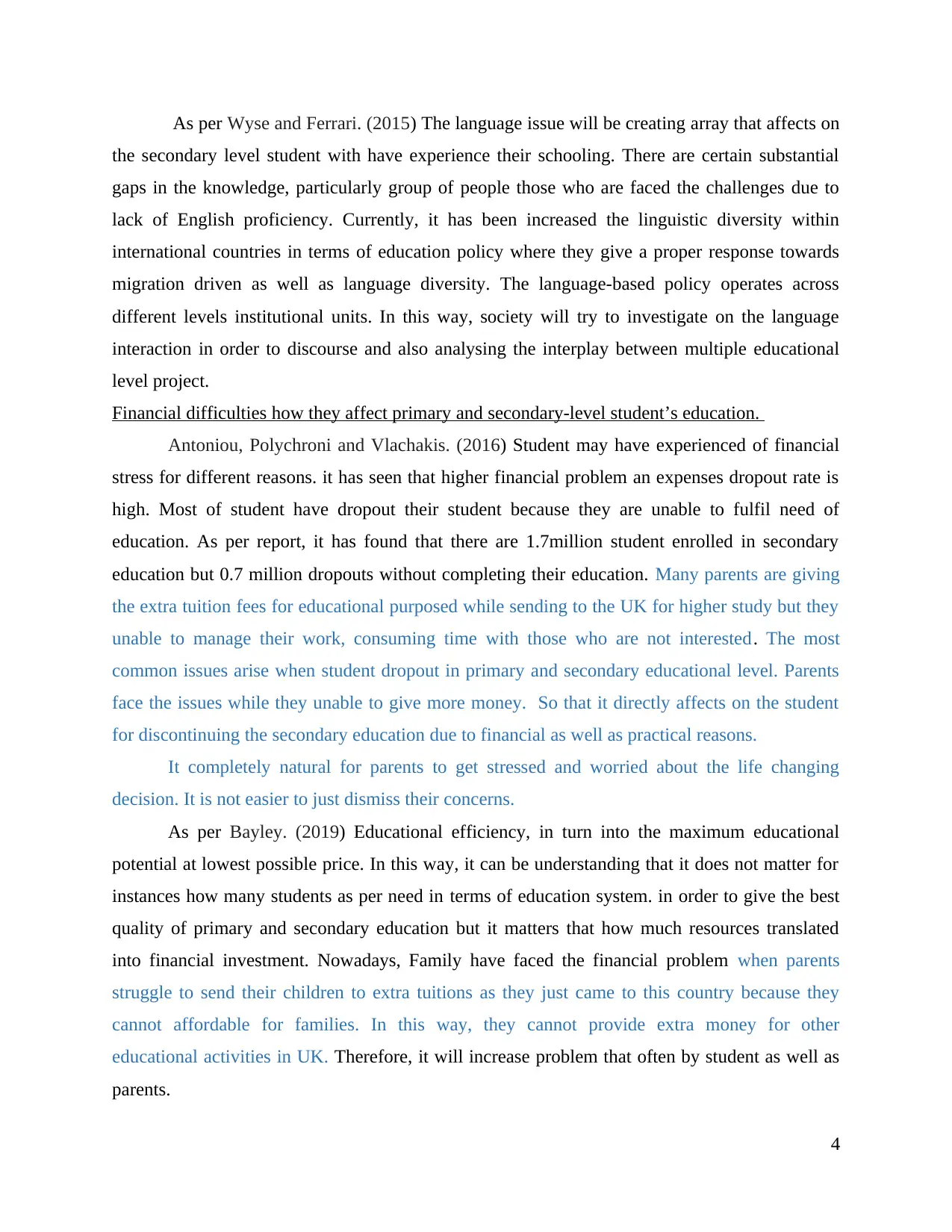
As per Wyse and Ferrari. (2015) The language issue will be creating array that affects on
the secondary level student with have experience their schooling. There are certain substantial
gaps in the knowledge, particularly group of people those who are faced the challenges due to
lack of English proficiency. Currently, it has been increased the linguistic diversity within
international countries in terms of education policy where they give a proper response towards
migration driven as well as language diversity. The language-based policy operates across
different levels institutional units. In this way, society will try to investigate on the language
interaction in order to discourse and also analysing the interplay between multiple educational
level project.
Financial difficulties how they affect primary and secondary-level student’s education.
Antoniou, Polychroni and Vlachakis. (2016) Student may have experienced of financial
stress for different reasons. it has seen that higher financial problem an expenses dropout rate is
high. Most of student have dropout their student because they are unable to fulfil need of
education. As per report, it has found that there are 1.7million student enrolled in secondary
education but 0.7 million dropouts without completing their education. Many parents are giving
the extra tuition fees for educational purposed while sending to the UK for higher study but they
unable to manage their work, consuming time with those who are not interested. The most
common issues arise when student dropout in primary and secondary educational level. Parents
face the issues while they unable to give more money. So that it directly affects on the student
for discontinuing the secondary education due to financial as well as practical reasons.
It completely natural for parents to get stressed and worried about the life changing
decision. It is not easier to just dismiss their concerns.
As per Bayley. (2019) Educational efficiency, in turn into the maximum educational
potential at lowest possible price. In this way, it can be understanding that it does not matter for
instances how many students as per need in terms of education system. in order to give the best
quality of primary and secondary education but it matters that how much resources translated
into financial investment. Nowadays, Family have faced the financial problem when parents
struggle to send their children to extra tuitions as they just came to this country because they
cannot affordable for families. In this way, they cannot provide extra money for other
educational activities in UK. Therefore, it will increase problem that often by student as well as
parents.
4
the secondary level student with have experience their schooling. There are certain substantial
gaps in the knowledge, particularly group of people those who are faced the challenges due to
lack of English proficiency. Currently, it has been increased the linguistic diversity within
international countries in terms of education policy where they give a proper response towards
migration driven as well as language diversity. The language-based policy operates across
different levels institutional units. In this way, society will try to investigate on the language
interaction in order to discourse and also analysing the interplay between multiple educational
level project.
Financial difficulties how they affect primary and secondary-level student’s education.
Antoniou, Polychroni and Vlachakis. (2016) Student may have experienced of financial
stress for different reasons. it has seen that higher financial problem an expenses dropout rate is
high. Most of student have dropout their student because they are unable to fulfil need of
education. As per report, it has found that there are 1.7million student enrolled in secondary
education but 0.7 million dropouts without completing their education. Many parents are giving
the extra tuition fees for educational purposed while sending to the UK for higher study but they
unable to manage their work, consuming time with those who are not interested. The most
common issues arise when student dropout in primary and secondary educational level. Parents
face the issues while they unable to give more money. So that it directly affects on the student
for discontinuing the secondary education due to financial as well as practical reasons.
It completely natural for parents to get stressed and worried about the life changing
decision. It is not easier to just dismiss their concerns.
As per Bayley. (2019) Educational efficiency, in turn into the maximum educational
potential at lowest possible price. In this way, it can be understanding that it does not matter for
instances how many students as per need in terms of education system. in order to give the best
quality of primary and secondary education but it matters that how much resources translated
into financial investment. Nowadays, Family have faced the financial problem when parents
struggle to send their children to extra tuitions as they just came to this country because they
cannot affordable for families. In this way, they cannot provide extra money for other
educational activities in UK. Therefore, it will increase problem that often by student as well as
parents.
4
⊘ This is a preview!⊘
Do you want full access?
Subscribe today to unlock all pages.

Trusted by 1+ million students worldwide
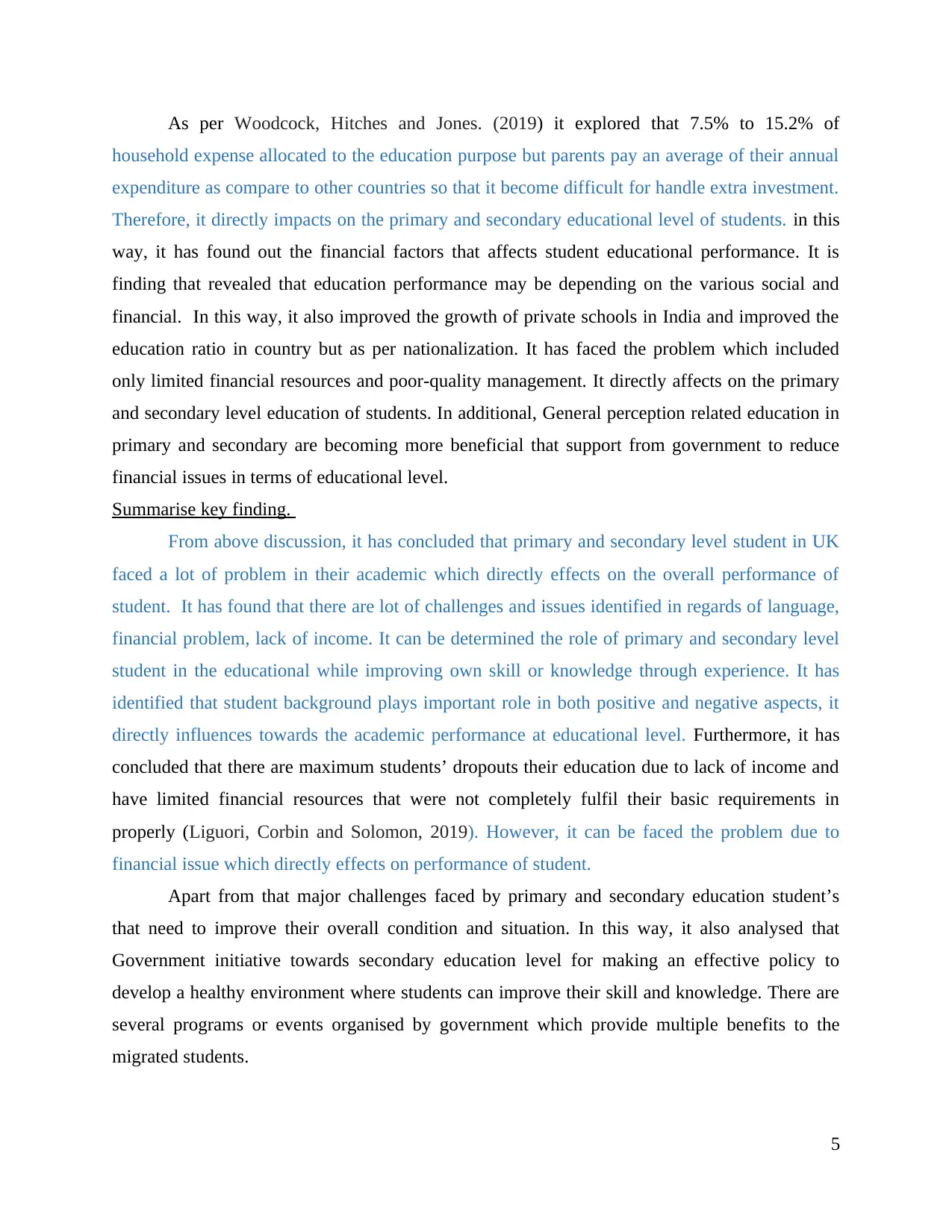
As per Woodcock, Hitches and Jones. (2019) it explored that 7.5% to 15.2% of
household expense allocated to the education purpose but parents pay an average of their annual
expenditure as compare to other countries so that it become difficult for handle extra investment.
Therefore, it directly impacts on the primary and secondary educational level of students. in this
way, it has found out the financial factors that affects student educational performance. It is
finding that revealed that education performance may be depending on the various social and
financial. In this way, it also improved the growth of private schools in India and improved the
education ratio in country but as per nationalization. It has faced the problem which included
only limited financial resources and poor-quality management. It directly affects on the primary
and secondary level education of students. In additional, General perception related education in
primary and secondary are becoming more beneficial that support from government to reduce
financial issues in terms of educational level.
Summarise key finding.
From above discussion, it has concluded that primary and secondary level student in UK
faced a lot of problem in their academic which directly effects on the overall performance of
student. It has found that there are lot of challenges and issues identified in regards of language,
financial problem, lack of income. It can be determined the role of primary and secondary level
student in the educational while improving own skill or knowledge through experience. It has
identified that student background plays important role in both positive and negative aspects, it
directly influences towards the academic performance at educational level. Furthermore, it has
concluded that there are maximum students’ dropouts their education due to lack of income and
have limited financial resources that were not completely fulfil their basic requirements in
properly (Liguori, Corbin and Solomon, 2019). However, it can be faced the problem due to
financial issue which directly effects on performance of student.
Apart from that major challenges faced by primary and secondary education student’s
that need to improve their overall condition and situation. In this way, it also analysed that
Government initiative towards secondary education level for making an effective policy to
develop a healthy environment where students can improve their skill and knowledge. There are
several programs or events organised by government which provide multiple benefits to the
migrated students.
5
household expense allocated to the education purpose but parents pay an average of their annual
expenditure as compare to other countries so that it become difficult for handle extra investment.
Therefore, it directly impacts on the primary and secondary educational level of students. in this
way, it has found out the financial factors that affects student educational performance. It is
finding that revealed that education performance may be depending on the various social and
financial. In this way, it also improved the growth of private schools in India and improved the
education ratio in country but as per nationalization. It has faced the problem which included
only limited financial resources and poor-quality management. It directly affects on the primary
and secondary level education of students. In additional, General perception related education in
primary and secondary are becoming more beneficial that support from government to reduce
financial issues in terms of educational level.
Summarise key finding.
From above discussion, it has concluded that primary and secondary level student in UK
faced a lot of problem in their academic which directly effects on the overall performance of
student. It has found that there are lot of challenges and issues identified in regards of language,
financial problem, lack of income. It can be determined the role of primary and secondary level
student in the educational while improving own skill or knowledge through experience. It has
identified that student background plays important role in both positive and negative aspects, it
directly influences towards the academic performance at educational level. Furthermore, it has
concluded that there are maximum students’ dropouts their education due to lack of income and
have limited financial resources that were not completely fulfil their basic requirements in
properly (Liguori, Corbin and Solomon, 2019). However, it can be faced the problem due to
financial issue which directly effects on performance of student.
Apart from that major challenges faced by primary and secondary education student’s
that need to improve their overall condition and situation. In this way, it also analysed that
Government initiative towards secondary education level for making an effective policy to
develop a healthy environment where students can improve their skill and knowledge. There are
several programs or events organised by government which provide multiple benefits to the
migrated students.
5
Paraphrase This Document
Need a fresh take? Get an instant paraphrase of this document with our AI Paraphraser

6
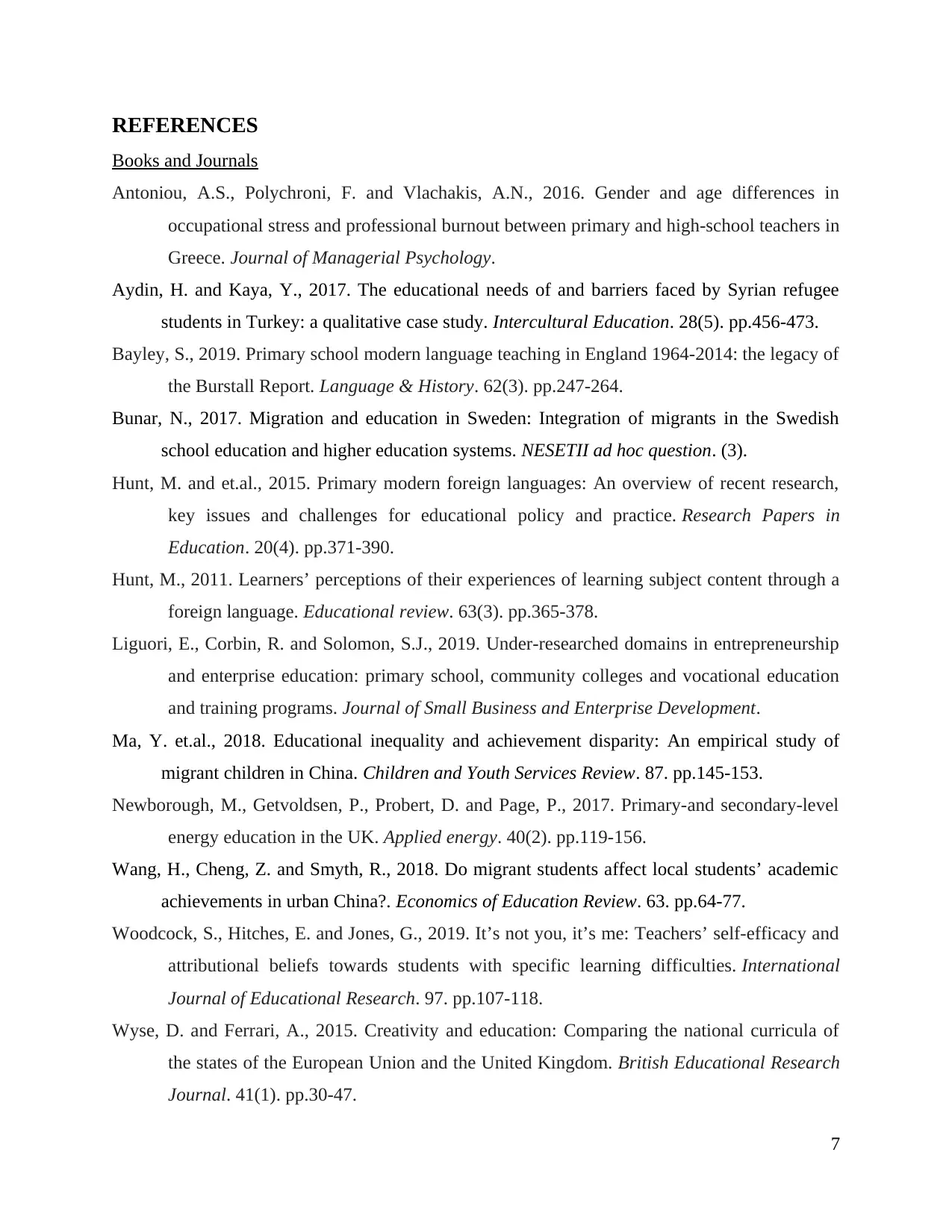
REFERENCES
Books and Journals
Antoniou, A.S., Polychroni, F. and Vlachakis, A.N., 2016. Gender and age differences in
occupational stress and professional burnout between primary and high‐school teachers in
Greece. Journal of Managerial Psychology.
Aydin, H. and Kaya, Y., 2017. The educational needs of and barriers faced by Syrian refugee
students in Turkey: a qualitative case study. Intercultural Education. 28(5). pp.456-473.
Bayley, S., 2019. Primary school modern language teaching in England 1964-2014: the legacy of
the Burstall Report. Language & History. 62(3). pp.247-264.
Bunar, N., 2017. Migration and education in Sweden: Integration of migrants in the Swedish
school education and higher education systems. NESETII ad hoc question. (3).
Hunt, M. and et.al., 2015. Primary modern foreign languages: An overview of recent research,
key issues and challenges for educational policy and practice. Research Papers in
Education. 20(4). pp.371-390.
Hunt, M., 2011. Learners’ perceptions of their experiences of learning subject content through a
foreign language. Educational review. 63(3). pp.365-378.
Liguori, E., Corbin, R. and Solomon, S.J., 2019. Under-researched domains in entrepreneurship
and enterprise education: primary school, community colleges and vocational education
and training programs. Journal of Small Business and Enterprise Development.
Ma, Y. et.al., 2018. Educational inequality and achievement disparity: An empirical study of
migrant children in China. Children and Youth Services Review. 87. pp.145-153.
Newborough, M., Getvoldsen, P., Probert, D. and Page, P., 2017. Primary-and secondary-level
energy education in the UK. Applied energy. 40(2). pp.119-156.
Wang, H., Cheng, Z. and Smyth, R., 2018. Do migrant students affect local students’ academic
achievements in urban China?. Economics of Education Review. 63. pp.64-77.
Woodcock, S., Hitches, E. and Jones, G., 2019. It’s not you, it’s me: Teachers’ self-efficacy and
attributional beliefs towards students with specific learning difficulties. International
Journal of Educational Research. 97. pp.107-118.
Wyse, D. and Ferrari, A., 2015. Creativity and education: Comparing the national curricula of
the states of the European Union and the United Kingdom. British Educational Research
Journal. 41(1). pp.30-47.
7
Books and Journals
Antoniou, A.S., Polychroni, F. and Vlachakis, A.N., 2016. Gender and age differences in
occupational stress and professional burnout between primary and high‐school teachers in
Greece. Journal of Managerial Psychology.
Aydin, H. and Kaya, Y., 2017. The educational needs of and barriers faced by Syrian refugee
students in Turkey: a qualitative case study. Intercultural Education. 28(5). pp.456-473.
Bayley, S., 2019. Primary school modern language teaching in England 1964-2014: the legacy of
the Burstall Report. Language & History. 62(3). pp.247-264.
Bunar, N., 2017. Migration and education in Sweden: Integration of migrants in the Swedish
school education and higher education systems. NESETII ad hoc question. (3).
Hunt, M. and et.al., 2015. Primary modern foreign languages: An overview of recent research,
key issues and challenges for educational policy and practice. Research Papers in
Education. 20(4). pp.371-390.
Hunt, M., 2011. Learners’ perceptions of their experiences of learning subject content through a
foreign language. Educational review. 63(3). pp.365-378.
Liguori, E., Corbin, R. and Solomon, S.J., 2019. Under-researched domains in entrepreneurship
and enterprise education: primary school, community colleges and vocational education
and training programs. Journal of Small Business and Enterprise Development.
Ma, Y. et.al., 2018. Educational inequality and achievement disparity: An empirical study of
migrant children in China. Children and Youth Services Review. 87. pp.145-153.
Newborough, M., Getvoldsen, P., Probert, D. and Page, P., 2017. Primary-and secondary-level
energy education in the UK. Applied energy. 40(2). pp.119-156.
Wang, H., Cheng, Z. and Smyth, R., 2018. Do migrant students affect local students’ academic
achievements in urban China?. Economics of Education Review. 63. pp.64-77.
Woodcock, S., Hitches, E. and Jones, G., 2019. It’s not you, it’s me: Teachers’ self-efficacy and
attributional beliefs towards students with specific learning difficulties. International
Journal of Educational Research. 97. pp.107-118.
Wyse, D. and Ferrari, A., 2015. Creativity and education: Comparing the national curricula of
the states of the European Union and the United Kingdom. British Educational Research
Journal. 41(1). pp.30-47.
7
⊘ This is a preview!⊘
Do you want full access?
Subscribe today to unlock all pages.

Trusted by 1+ million students worldwide

8
Paraphrase This Document
Need a fresh take? Get an instant paraphrase of this document with our AI Paraphraser

9
1 out of 11
Related Documents
Your All-in-One AI-Powered Toolkit for Academic Success.
+13062052269
info@desklib.com
Available 24*7 on WhatsApp / Email
![[object Object]](/_next/static/media/star-bottom.7253800d.svg)
Unlock your academic potential
Copyright © 2020–2026 A2Z Services. All Rights Reserved. Developed and managed by ZUCOL.




